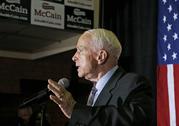- California Assembly OKs highest minimum wage in nation
- S. Korea unveils first graphic cigarette warnings
- US joins with South Korea, Japan in bid to deter North Korea
- LPGA golfer Chun In-gee finally back in action
- S. Korea won’t be top seed in final World Cup qualification round
- US men’s soccer misses 2nd straight Olympics
- US back on track in qualifying with 4-0 win over Guatemala
- High-intensity workout injuries spawn cottage industry
- CDC expands range of Zika mosquitoes into parts of Northeast
- Who knew? ‘The Walking Dead’ is helping families connect
BACK US SO WE CAN BLOCK CLINTON AGENDA, SAY SOME REPUBLICANS
WASHINGTON (AP) — It’s just a trickle now, but some Republicans are urging people to back GOP congressional candidates because they’d constrain Hillary Clinton’s agenda should she be elected president this November. 
Republicans don’t want to be blamed for prematurely giving up on Donald Trump, the party’s presidential nominee, for fear of alienating his supporters. But with Trump lagging in most polls and Election Day two months off, many in the GOP view the strategy as low-risk because of the deep antipathy many Republicans hold toward Clinton.
“Trump supporters are so die-hard that it’s highly unlikely they’re going to vote for Democratic candidates,” said GOP strategist Ron Bonjean. “They may be unhappy with Republican members saying those things, but it’s unlikely they’re going to walk away from them.”
Sen. John McCain, R-Ariz., facing a competitive re-election fight, unveiled a video this week promising to “act as a check, not a rubber stamp,” if Clinton wins the White House. In fundraising emails in recent weeks, House Speaker Paul Ryan, R-Wis., GOP operative Karl Rove and a Colorado lawmaker battling for his seat made similar appeals.
“America cannot afford an unchecked Hillary Clinton presidency,” Rove wrote. “If she wins, we will need a strong Republican House to defend against her radical liberal agenda.”
McCain, who released his video after winning his primary election on Tuesday, faces a challenge for his sixth term from Democratic Rep. Ann Kirkpatrick. He’s backed Trump, even though the celebrity real estate magnate has ridiculed McCain’s time as a prisoner of war and assailed immigrants in the U.S. illegally, riling crucial Hispanic voters in the state and elsewhere.
McCain’s five-minute video, posted on his campaign website and social media, does not mention Trump by name.
Ryan’s fundraising appeal for Republicans, sent last month, opens with, “I worry about what will happen if Hillary Clinton is elected president,” adding, “The situation would be even worse if we fail to protect our House majority.”
In a competitive district around Denver, Colorado, GOP Rep. Mike Coffman used a fundraising note to criticize Democratic opponent Morgan Carroll for saying Clinton needs a Congress “that has her back.”
“We simply cannot let Colorado be represented by a rubber stamp for the Clinton agenda,” Coffman wrote.
Democrats, who plan to spend much of the fall campaign linking GOP candidates to Trump, say the GOP tactic will not work. Lauren Passalacqua, spokeswoman for the Democratic Senatorial Campaign Committee, said voters will dismiss Republicans as acting for pure self-preservation if they abandon Trump “and say, ‘You know what, forget that guy, I’ll be a real check on the president.’”
Trump campaign spokespeople did not immediately reply to requests for comment.
GOP pleas to protect the party’s congressional majorities so they can block Clinton will likely grow if Trump continues trailing in polls as Election Day nears. Many Republicans have already distanced themselves from him because his hard-right stances and insulting comments have alienated many women, Hispanic and suburban voters.
Republican consultant Josh Holmes, former chief of staff to Senate Majority Leader Mitch McConnell, R-Ky., said asking voters to use a GOP Congress to restrain Clinton is a smart, essential tactic.
“It’s particularly effective this cycle because of the intense distrust of Hillary Clinton,” said Holmes.
GOP congressional candidates used the same argument late in the 1996 campaign, when GOP presidential candidate Bob Dole headed toward defeat against Democratic President Bill Clinton. Republicans retained their House and Senate majorities that year, winning two Senate seats and losing only 3 seats in the House.
“If they do it deftly, it’s not risky. You don’t go out trashing anyone,” said GOP pollster Whit Ayres. Instead, Republicans should just say, “‘We’re going to need a Senate and House that’s a check on whoever’s president,’ given the unpopularity of the two major nominees.”











